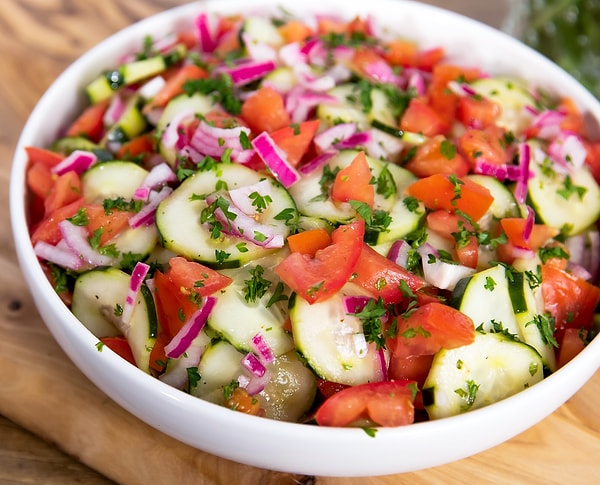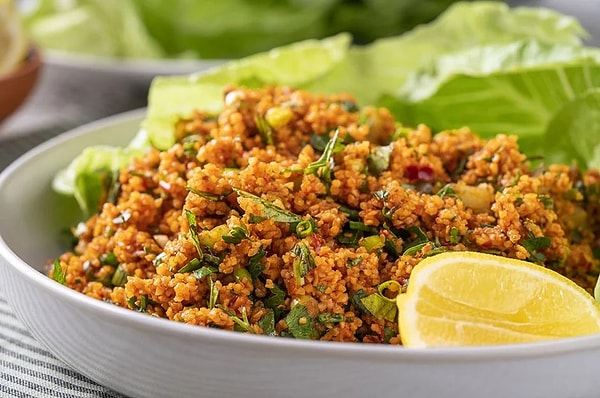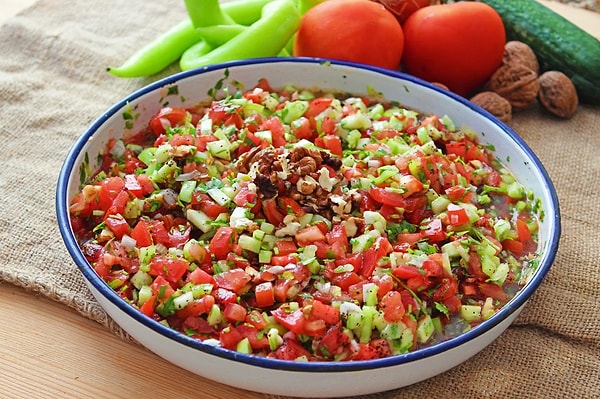The Vibrant World of Turkish Salads: A Celebration of Freshness and Flavors
Turkish cuisine is renowned for its rich and diverse flavors, with a myriad of dishes that tantalize the taste buds and leave a lasting impression. At the heart of this culinary tradition lies a vibrant array of salads that showcase the country's love for fresh ingredients, bold spices, and robust flavors. Turkish salads are not just side dishes; they are an integral part of the meal, providing a refreshing and healthy complement to the main course. In this article, we will take a deep dive into the world of Turkish salads, exploring their origins, unique characteristics, and highlighting some popular varieties that have become beloved both within Turkey and around the world.
Origins and Influences:

Turkish cuisine draws influence from the diverse cultures that have shaped the region's history, resulting in a delightful blend of flavors and techniques. The roots of Turkish salads can be traced back to ancient times when the Ottoman Empire reigned supreme. Ottoman cuisine integrated ingredients and cooking methods from the Middle East, Central Asia, and the Mediterranean, giving birth to a remarkable culinary heritage. Salads played a significant role in Ottoman cuisine, with a focus on using local produce and herbs to create refreshing and healthy dishes.
Key Ingredients and Preparation:

Turkish salads are characterized by their use of fresh and seasonal ingredients, ensuring a burst of flavors with every bite. Vegetables like tomatoes, cucumbers, peppers, and onions form the base of many salads, providing a crisp and refreshing texture. Herbs such as parsley, mint, dill, and cilantro add a fragrant and vibrant element to the salads. Other key ingredients include olives, feta cheese, olive oil, lemon juice, and pomegranate molasses. The combination of these elements creates a harmonious balance of flavors that is both light and satisfying.
Traditional Turkish Salad Varieties:
a) Shepherd's Salad (Çoban Salatası):

This classic salad is a staple on Turkish tables. It features finely chopped tomatoes, cucumbers, onions, and peppers, dressed with lemon juice, olive oil, and a sprinkle of salt. The simplicity of this salad allows the freshness of the ingredients to shine through, making it a refreshing and delightful choice.
b) Kisir:

Kisir is a bulgur salad with a zesty twist. It combines fine bulgur wheat with chopped tomatoes, onions, parsley, mint, lemon juice, olive oil, and pomegranate molasses. The result is a vibrant salad bursting with tangy and sweet flavors, perfect as a light lunch or a side dish for grilled meats.
c) Ezme:

Ezme is a spicy and tangy salad that packs a punch of flavors. It consists of finely chopped tomatoes, onions, peppers, parsley, garlic, and a combination of spices such as red pepper flakes and sumac. The salad is finished with a drizzle of lemon juice and pomegranate molasses, creating a mouthwatering blend of heat and acidity.
d) Gavurdagi Salad:

Originating from the southeastern region of Turkey, Gavurdagi Salad showcases a delightful combination of flavors. It combines diced tomatoes, onions, parsley, walnuts, and pomegranate seeds, dressed with olive oil, lemon juice, and pomegranate molasses. The salad's contrasting textures and sweet-tart flavors make it a true culinary delight.
Regional Variations:

As with many traditional dishes, Turkish salads can vary from region to region, reflecting the local produce and culinary preferences. For instance, the Antalya region is known for its orange and pomegranate-based salads, while the Black Sea region incorporates local hazelnuts into their salads. Exploring these regional variations allows one to experience the diverse flavors and culinary traditions within Turkey.
The Health Benefits of Turkish Salads:

Turkish salads are not only delicious but also offer a range of health benefits. They are packed with vitamins, minerals, and dietary fiber from fresh vegetables, promoting overall well-being. The generous use of herbs provides antioxidants and phytonutrients that support a healthy immune system. Moreover, the incorporation of olive oil, a staple in Turkish cuisine, offers heart-healthy monounsaturated fats that contribute to a balanced diet.
Turkish Salads Beyond Borders:

Over the years, Turkish salads have gained popularity beyond the borders of Turkey. Their vibrant flavors, fresh ingredients, and healthy attributes have made them a favorite in many international culinary circles. Turkish restaurants around the world proudly serve these salads, introducing people to the delightful world of Turkish cuisine and its refreshing salads.
How do you like your salad? Tell us in the comments!
Keşfet ile ziyaret ettiğin tüm kategorileri tek akışta gör!


Send Comment